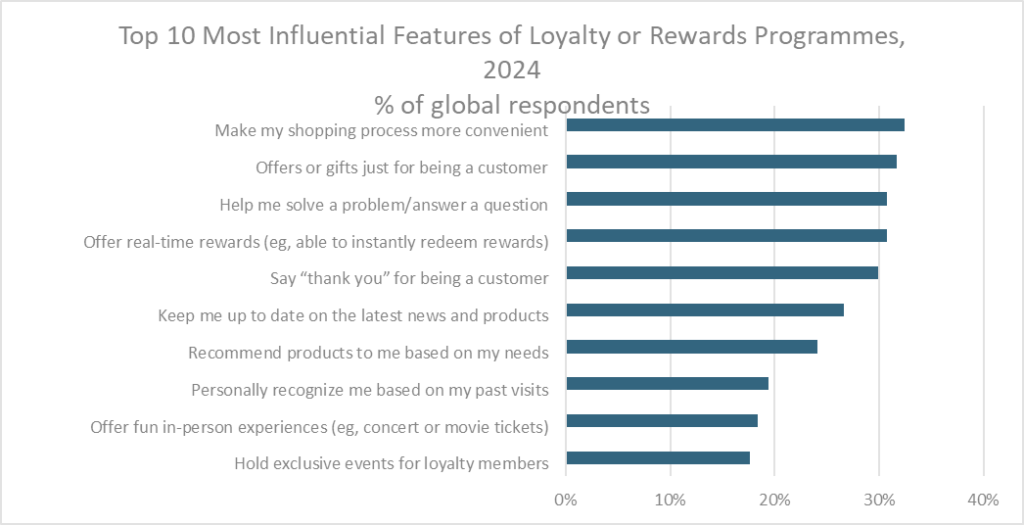FMCG companies are reassessing their loyalty programme strategies, as traditional models struggle to enhance deeper customer engagement. To achieve meaningful results, these strategies must be tailored to the unique needs, product, and operational strengths of each company, usually at the brand level, ensuring a more personalised approach to customer retention and growth. Nadejda Popova from Euromonitor International, in collaboration with Federico Couret from Loyalty & Reward Co offers an in-depth analysis of the loyalty tactics used by top FMCG companies to maintain a competitive edge. You can find the original version here
AUTHORS: Nadejda Popova, Federico Couret
Shifting strategies in the age of direct consumer engagement
Historically, fast-moving consumer goods (FMCGs) were sold through a wide network of physical retailers and supermarkets. Brands relied on these outlets to drive incremental sales, build brand preference and develop consumer habits, often coordinating promotions such as gifts with purchase, discounts, or 2-for-1 offers. In return, brands provided rebates to retailers for fulfilling these offers.
With the rise of digital channels, including online grocery platforms and e-commerce giants like Amazon, the reach of FMCGs has expanded. However, while these offer opportunities, online retailers control the data, limiting brands’ direct access to consumers. Additionally, mass media audiences are fragmented across digital platforms, forcing brands to spread their promotional budgets.
Loyalty is increasingly recognised as a strategy for FMCG companies, helping brands achieve higher customer retention and increased repeat purchases. As FMCGs learn to build long-term customer relationships through first-party data, these strategies are proving essential in an increasingly fragmented and competitive market.
Maximising reach to unlock new audiences
Amid the ongoing cost-of-living crisis, consumers are turning to direct selling as a way to augment their household earnings. Direct-to-consumer players continue to strive for wins among consumers by expanding their omnichannel presence and establishing the right partnerships with brick-and-mortar retailers, with Asia Pacific leading the way worldwide.

Source: Euromonitor International
Traditionally, FMCG companies’ business models did not support direct selling, which inherently hindered the development of loyalty programmes. However, this is changing. Companies such as Unilever, L’Oréal, Heinz, and Morinaga & Co, among others, are now leveraging brand trust to enable direct sales through online marketplaces and nurture personalisation.
The latter can represent a challenge for mass-market producers which prioritise standardised products and focus heavily on scale. As a result, FMCG players are increasingly launching loyalty programmes at the brand level to help entice new consumer segments and foster stronger consumer engagement. Reckitt Benckiser, leader in consumer health and owner of Schiff, launched Schiff Rewards, a loyalty programme that rewards members for entering product codes, regardless of the retailer, while offering perks such as a Virtual Visa prepaid card to drive brand engagement and strengthen emotional connections with customers. Meanwhile, FEMSA, the Mexican multinational conglomerate, introduced Spin Premia for its OXXO subsidiary. The programme offers customers rewards for purchases across a wide partner network.
This shift is driven by increased consumer awareness of loyalty membership benefits and how to maximise spending to rationalise the cost of membership. As the market navigates changes, brands will need to carefully evaluate their distribution strategies to ensure they remain relevant and responsive to changing consumer behaviour and the competitive environment.
Embracing innovation tactics opens opportunities ahead
Evolving consumer expectations and technological advancements are reshaping both society and the loyalty profession. Many retailers now integrate loyalty accounts with digital wallets or apps, enabling customers to complete purchases quickly using saved payment methods and rewards points, streamlining the checkout process.
The increasing desire for personalisation, commitment to sustainability and demand for immersive experiences are driving loyalty programmes to meet these new standards.
78% of consumers value real world experiences, 63% try to have a positive effect on the environment and 21% look for a personalised shopping experience when engaging with brands
Source: Euromonitor Voice of the Consumer: Lifestyles Survey, fielded January to February 2024
Recent trends and new technologies are enabling FMCG brands to create a valuable exchange where consumers willingly share data in return for better experiences, personalised interactions, alignment with their values, and added benefits.

Source: Euromonitor Voice of the Consumer: Loyalty Survey, fielded March-April 2024
Throughout the customer journey, brands are increasingly leveraging technology to enhance convenience and drive engagement. While many brands offer rewards like discounts, coupons, or points at checkout, some are going beyond the purchase experience. They are using advanced tools to create more personalised, valuable interactions with their customers, fostering deeper connections.
Hyper-personalisation driven by AI and data analytics are revolutionising customer engagement, exemplified by Hellmann’s Meal Reveal tool. Developed with Google Cloud, it suggests personalised recipes by scanning fridge ingredients, promoting convenience and sustainability. Similarly, Nestlé’s Collect programme encourages eco-conscious consumers to recycle packaging, supporting environmental preservation through a sustainability-focused loyalty initiative.
Considering these trends, it’s clear that developing well-functioning loyalty strategies is both essential and achievable, especially when they align with the deeper values that shape today’s society. These examples show how brands can establish meaningful connections with customers while driving loyalty.
Marketers must balance innovation with caution, respecting privacy and avoiding intrusion in loyalty initiatives. The future of FMCG loyalty programmes hinges on building trust and meeting evolving customer expectations.

